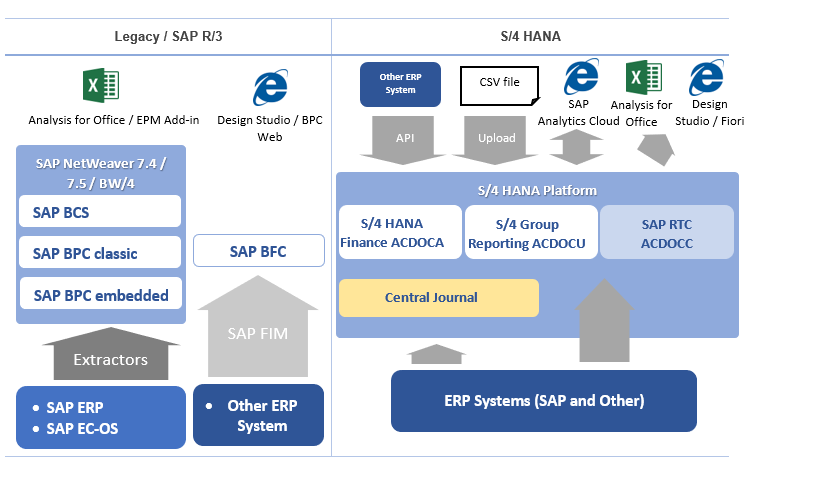This is the second of a series of LinkedIn posts where Stampa & Partners answers the question: “How to leverage a full S/4 Finance implementation for budgeting and legal and management consolidation purposes?”

SAP Group Reporting is a tool built on the S/4HANA platform which addresses the objectives of an efficient consolidation process. In this second post we want to present the most relevant differences between the SAP R/3 vs. S/4 HANA landscape. The main practical difference resides on the simplification and flexibility of S/4 architecture.

In a legacy (R/3) world, an ERP booking is either extracted directly to the consolidation tool or exported to a Data Warehouse (for example SAP BW) before being imported to the consolidation tool. These exports will result in a delay between the posting and the availability of the figures in the consolidation system.
Using S/4 Hana Platform, the ERP system (HANA Finance) is in the same platform as the consolidation tool (Group Reporting). The user is therefore only a click away from importing the ERP data into the consolidation system. Exceptions can be customised for example for subsidiaries of entities which do not share the same ERP system, by using other files for integration (e.g. connection via API, upload CSV files, manual data with dedicated SAP Analytics Cloud or a Central Finance connection).
The changes on the architecture increase automation and bring some other very relevant improvements:

As mentioned, sitting the ERP system and the consolidation tool in the same S/4 Hana platform, meaning that any booking in either system would be register at the same source of data. This avoids differences on the financials between systems that result from last minute postings directly on the consolidation tool.
Therefore, Group Reporting’s architecture eases and speeds the group closing process and decrease compliance and assurance efforts representing relevant cost reductions. At the same time the tool keeps all the relevant information from the sources (i.e. accounting details), which enhances its reporting capabilities.
Please stay connected to access next week’s post on Group Reporting Data collection process.
A new webinar will be schedule later in 2020 so please register in our website or like our page to have notifications on this and other events.
We at Stampa & Partners have an extensive track record working with CFOs and supporting organisations in Europe successfully digitalise finance functions, leverage analytics and ensure compliance with new accounting standards. Therefore, we can advise your business with the best solutions to fulfil your goals.
By André Almeida